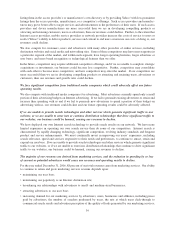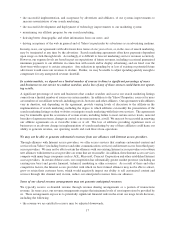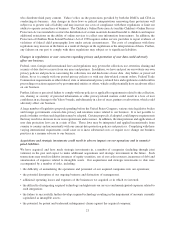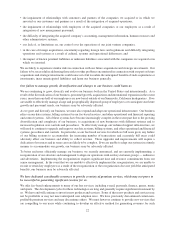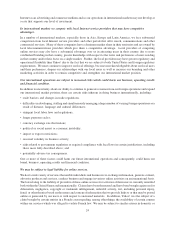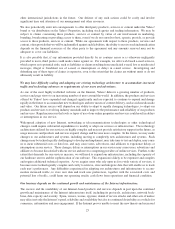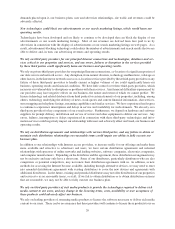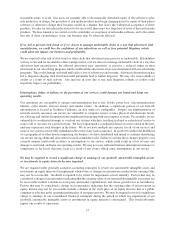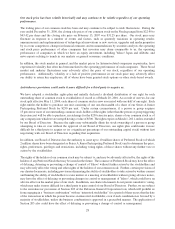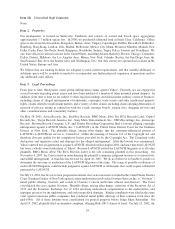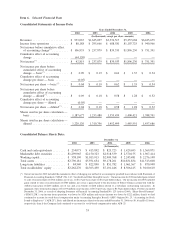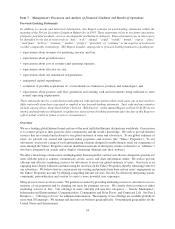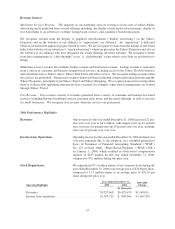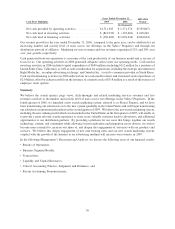Yahoo 2006 Annual Report Download - page 36
Download and view the complete annual report
Please find page 36 of the 2006 Yahoo annual report below. You can navigate through the pages in the report by either clicking on the pages listed below, or by using the keyword search tool below to find specific information within the annual report.demands placed upon it, our business plans, user and advertiser relationships, site traffic and revenues could be
adversely affected.
New technologies could block our advertisements or our search marketing listings, which would harm our
operating results.
Technologies have been developed and are likely to continue to be developed that can block the display of our
advertisements or our search marketing listings. Most of our revenues are derived from fees paid to us by
advertisers in connection with the display of advertisements or our search marketing listings on web pages. As a
result, advertisement-blocking technology could reduce the number of advertisements and search results that we are
able to deliver and, in turn, our advertising revenues and operating results.
We rely on third party providers for our principal Internet connections and technologies, databases and ser-
vices critical to our properties and services, and any errors, failures or disruption in the services provided
by these third parties could significantly harm our business and operating results.
We rely on private third-party providers for our principal Internet connections, co-location of a significant portion of
our data servers and network access. Any disruption, from natural disasters, technology malfunctions, sabotage or
other factors, in the Internet or network access or co-location services provided by these third-party providers or any
failure of these third-party providers to handle current or higher volumes of use could significantly harm our
business, operating results and financial condition. We have little control over these third-party providers, which
increases our vulnerability to disruptions or problems with their services. Any financial difficulties experienced by
our providers may have negative effects on our business, the nature and extent of which we cannot predict. We
license technology and related databases from third parties for certain elements of our properties, including, among
others, technology underlying the delivery of news, stock quotes and current financial information, chat services,
street mapping and telephone listings, streaming capabilities and similar services. We have experienced and expect
to continue to experience interruptions and delays in service and availability for such elements. We also rely on a
third-party provider for key components of our e-mail service. Furthermore, we depend on hardware and software
suppliers for prompt delivery, installation and service of servers and other equipment to deliver our services. Any
errors, failures, interruptions or delays experienced in connection with these third-party technologies and infor-
mation services could negatively impact our relationship with users and adversely affect our brand, our business and
operating results.
We rely on distribution agreements and relationships with various third parties, and any failure to obtain or
maintain such distribution relationships on reasonable terms could impair our ability to fully execute our
business plan.
In addition to our relationships with Internet access providers, to increase traffic for our offerings and make them
more available and attractive to advertisers and users, we have certain distribution agreements and informal
relationships with operators of online networks and leading websites, software companies, electronics companies,
and computer manufacturers. Depending on the distributor and the agreement, these distribution arrangements may
not be exclusive and may only have a short term. Some of our distributors, particularly distributors who are also
competitors or potential competitors, may not renew their distribution agreements with us. In addition, as new
methods for accessing the Internet become available, including through alternative devices, we may need to enter
into amended distributions agreements with existing distributors to cover the new devices and agreements with
additional distributors. In the future, existing and potential distributors may not offer distribution of our properties
and services to us on reasonable terms, or at all. If we fail to obtain distribution or to obtain distribution on terms
that are reasonable, we may not be able to fully execute our business plan.
We rely on third party providers of rich media products to provide the technologies required to deliver rich
media content to our users, and any change in the licensing terms, costs, availability or user acceptance of
these products could adversely affect our business.
We rely on leading providers of streaming media products to license the software necessary to deliver rich media
content to our users. There can be no assurance that these providers will continue to license these products to us on
26


